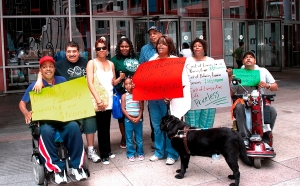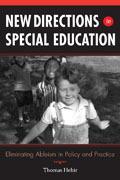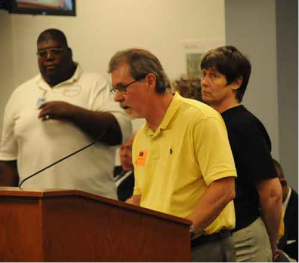
Access Living offers peer oriented, independent living services to individuals with disabilities. One such program is the Deinstitutionalization (DI) Program. The program was created in response to Illinois disproportional support of institutional care. Though the Americans with Disabilities Act and the Olmstead Supreme Court ruling of 1999 both give people with disabilities the right to receive services in their own home, thousands of people are forced into institutions because no community options exist. Through the DI program, counselors assist individuals with disabilities move out of nursing homes and into their own homes. An event was held at Access Living on April 16th to celebrate moving the program’s 250th consumer out of a nursing home to their own home. The event was called “No Place Like Home.”
Sam Martorano, who moved out of a nursing home through the DI program, hosted the event.
Below is a transcript of the event.
Sam: Hi Good Afternoon, I am Sam, I am from Access Living and we are here today to celebrate the DI group’s 250th person that we moved out of the nursing home. We are here to have a party and a celebration. We are here to have some great testimonials, some great food and some great entertainment. I am just going to ask this, I want to see with a show of hands of how many people are no longer in a nursing home who have been in a nursing home. All right I am just going to come around to a few people and I want you to tell me in one word how you feel about being out of a nursing home. Relaxed, marvelous, great, free, elated. All right. I work here at Access Living but I was once a person that was also in the same situation. I was in a nursing home just like a lot of these other people that you are going to meet today. I was in a nursing home for almost two and a half years, and through the help of Access Living and through their DI program here I was able to get out of the nursing home get a place of my own, and help volunteer here at Access Living and eventually become a staff associate here at Access Living today. And we are going to have a couple of testimonials from some people that have moved out of nursing home that we have helped. The first one is Chivon Nicole, come on up Chivon. So Chivon can you tell everybody your story and what it is like for you now that you are out in the community.
Chivon: It is real great to be back in the community, to be able to be in my own home. I want to thank everybody at Access Living the whole staff for being a great support. It is kinda dull in a nursing home. Everybody should you know, the people that couldn’t get out, god bless you all and I want God to bless the ones that are out.
Sam: Thank you Chivon, I am looking for Robert Fletcher…Come on up Robert. Robert is another one of our consumers that we have helped move out of a nursing home back into his own home.
Robert: My name is Robert Fletcher, but hereby call me Fletcher. I was in a nursing home myself, thanks to Access Living, I am out now, enjoy my place, beautiful place I got there. In the nursing home there is a lot we got to think about, you know as we was up in there. We think a lot during our stay, makes you want to think about what you want to do if you get out ,you get a lot to think about how you are feeling, why you are been there, a lot of us have been through that. Being out should be a joy and a blessing to everybody you know. To be really back here in society, where we really belong. Coz Nursing home ain’t for everybody, it is for some people that really need it the ones that don’t really need it, it is best that they be out here. Thanks to Access Living and a program like this here. It is a joy for me to meet up with them and probably joy for you all to meet up with them too. As I was there in the nursing home, I also used to be the President of resident council, when I was there in my nursing home in Bronzville. I helped out a lot of residents there, if they had any problems or concerns , they would bring it to me and I would take it to the administrator , you know, and we tried to get things done , I think I did pretty good up in Bronzville . And try to keep a lot of things in order with the residents and myself. If you look at it, some time it is not everybody but there are people who take advantage of other people, while you are up in there. So I was making sure that at least majority of them had something to look hopeful too. I also got a couple of people to join Access Living or get to the department of Aging. I know how it is I was there myself for 3.8 months. So that time up in there you go through your ups and down, we all go through that, I am glad to be out and am glad to see you all you here being out, enjoying and loving your place and just try to do good to society. I hope everybody well, and enjoyment party out.
Sam: Ok thank you Robert now the next person who will be coming here to speak is Tom Wilson
Tom Wilson: Thank you Sam. I have a few remarks today I am really glad you could all attend and congrats to all those who have gotten out of the Nursing home. We salute you in your success in leaving the Nursing home and living in the community. We know you have more rights greater safety living in the community. You know better than anyone (the rest of Tom’s speech was cut off)
Sam: Alright one other thing I need people here that were in our DI program that are now out in the community if you would take time, some time before you leave today to sign our banner we would proudly hang it up on our dept at Access Living so people can see the names of the people we helped get out of the Nursing home in the past few years. If you take the time to do that and sign our banner it would be greatly appreciated. Beto Barrera is next he wants to come up and speak.
Beto: Congrats you all. I just saw walking in two members or staff of CHA. Left is Amanda and Jessica and out of the 250 people that are free now they were responsible for more than 70 vouchers to get you all out. They have committed to another 50 until June of this year and they are applying to the US dept of housing and urban development to get 200 more real people out. Thank you to CHA, Jessica, Amanda thank you very much.
Sam: We are going to have one more speaker Damien.
Damien: Good afternoon everyone. Ladies and gentleman this is what we have all been talking about. We, Ladies and gentlemen. This is what we have been talking about. Nursing home is not good for all other people who are in the Nursing home; it is time to come out of the Nursing home. Enough is enough, look at the people in the Nursing home, do you all want them to stay in the Nursing home forever no, do you all want to find a home for your family and you yes ? Nursing home is not a place for nobody. I am sick and tired of telling of who the Nursing home people, enough is enough. When we go to Springfield next week we are going to ask congress stop acting like a … people….
I fear the holy ghost is coming here. I got the news for you. Next week when we go to Springfield, I want all of you and you and you and all of you , to go with us to Springfield , to demand the senator, the republicans, the house and the senate and the governor to stop it the nursing home from closing us. Look at the people who are in the Nursing home it is time for them to come out and move to their own home. Thank you all very much. God Bless United states of America and God bless the world.
Sam: Thank you Damien for the inspiring speech. I would like to take about a minute or two of silence for all the people who have died in the nursing home and for the people that have died whom we have helped move out of the nursing home.
Ok thank you.
You could also listen to the event online at:-http://www.chicagopublicradio.org/Content.aspx?audioID=41730#









